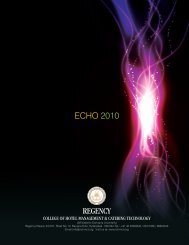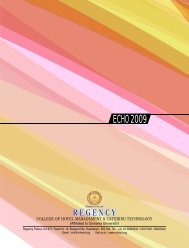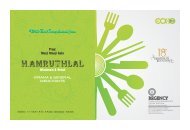ECHO 2016 COLLEGE MAGAZINE
Create successful ePaper yourself
Turn your PDF publications into a flip-book with our unique Google optimized e-Paper software.
HOTELIER’S ARTICLE<br />
Unbreaking The Egg<br />
he egg is a complex, biological<br />
Tpowerhouse of nutrients with<br />
innumerable culinary uses. One large<br />
egg contains 70 calories, 6 grams of<br />
protein, 5 grams of fat, (of which only<br />
1.6 grams are saturated), and at least<br />
14 vitamins and minerals. Most of the<br />
nutrients and 45% of the protein are in<br />
the yolk. The white contains mostly<br />
protein. Egg protein is one of the<br />
highest quality proteins on the planet,<br />
second only to breast milk. And while<br />
one large egg contains 213 mg. of<br />
cholesterol, it is saturated fat<br />
consumption that is more related to<br />
serum cholesterol levels than actual<br />
cholesterol consumption itself. Thus,<br />
with only 1.6 grams of saturated fat,<br />
eggs are not as unhealthy for your<br />
heart as generally supposed.<br />
FAST EGG FACTS:<br />
1. Eggs are graded, in descending<br />
order, AA, A, and B. Grades are<br />
based on quality which is influenced<br />
by the egg’s freshness. Grade A is<br />
the most common grade found in<br />
supermarkets.<br />
2. Brown eggs are no different than<br />
white eggs in terms of taste or<br />
nutrition. They merely signify a<br />
different breed of hen.<br />
3. Store eggs in their carton. Eggshells<br />
are porous and absorb surrounding<br />
odors inside your fridge.<br />
4. It is easier to separate the yolk from<br />
the white with a cold egg.<br />
5. To whip egg whites to maximal<br />
v o l u m e , s t a r t w i t h r o o m<br />
temperature whites, ensure there is<br />
no yolk in them, and use a copper<br />
bowl. Copper bowls produce the<br />
most stable and voluminous<br />
whipped egg whites because of the<br />
interaction between copper ions and<br />
proteins.<br />
6. To determine the freshness of an egg<br />
submerge it in water. Eggs have an<br />
air pocket that grows with time.<br />
Fresh eggs will lay flat on their side<br />
in water.<br />
As they age the one end will start to<br />
rise. If your egg floats, don’t eat it.<br />
7. For scrambled eggs, heating the pan<br />
before adding the eggs will reduce<br />
sticking.<br />
8. Egg whites lose their integrity with<br />
age. Thus, fresh eggs are best for<br />
poaching since the white will<br />
disperse less. Adding vinegar and/or<br />
salt to the water will further reduce<br />
its diffusion.<br />
9. Older eggs are best for hard-cooked<br />
eggs. (Culinary professionals avoid<br />
the term hard-boiled since the eggs<br />
are not actually boiled). The higher<br />
pH of older eggs allows the shells to<br />
peel easier. Thus, don’t add vinegar<br />
to the water for hard-cooked eggs.<br />
Over cooking causes greenish<br />
blemishes, the result of a reaction<br />
from the iron in the yolk with the<br />
sulfur in the white. For perfectly<br />
hard-cooked eggs, warm the eggs in<br />
hot tap water. This reduces the<br />
chance of them cracking. Then<br />
place them in cold water and bring to<br />
a boil. The instant it boils remove<br />
them from the heat and allow them<br />
to steep, covered, for 12-13 minutes.<br />
Then submerge in cold water to stop<br />
the cooking.<br />
Tired of the usual methods for<br />
preparing eggs? Try a frittata, i.e., an<br />
Italian omelet. Unlike a French omelet<br />
where the egg is folded over the<br />
ingredients, the ingredients are<br />
actually mixed into the eggs<br />
Chef. Venugopal Rao. A<br />
Corporate Chef<br />
Karak Gholam, Al Mejhem Global Group Co.<br />
Al Salamiya, Kuwait<br />
28 <strong>ECHO</strong> - <strong>2016</strong>
















